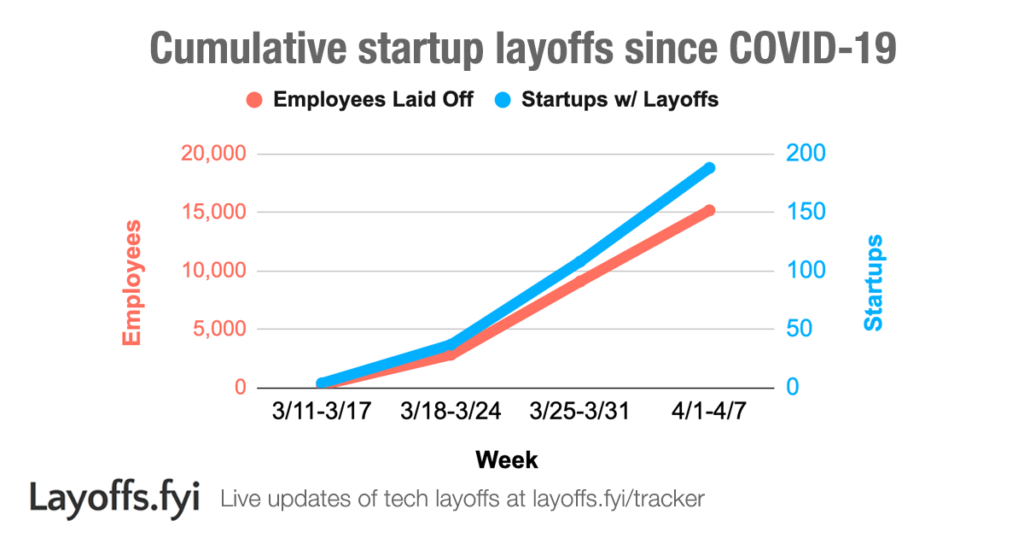Startups Through Pandemic: Revamp Your Operation Strategy to Survive
When the catastrophic costs of coronavirus pandemic become more and more evident, the consequences for healthy people go beyond the immediate imperative to protect lives. Taking care of our family and friends, our neighbors and community, our employees and colleagues is a top priority. For that reason, companies in industries and geographies have scrambled to establish remote working conditions, and continue to improve them as the health crisis continues. This is a challenge for startups to adapt to uncertainty.
It is becoming an all too common occurrence nowadays. Businesses across a range of industries reveal they will reduce staff yet again soon – without disclosing the timing, size, or probable targets. The announcements are meant to hearten investors, but they devastate morale.
The challenges are immediate, with long-term implications for global, regional, and local economies. Just how hard startups have been hit is something we’ve been reporting with new rounds of layoffs being revealed almost daily.
Layoffs Situation Amid The COVID-19 Pandemic
Within 2 months, March and April, a lot of companies have laid off employees as a result of the economic fallout caused by the coronavirus pandemic. The coronavirus pandemic has caused layoffs industrywide, even the most high-flying startups are feeling the effects of this situation.
Layoffs have hit many corners of the corporate world. And they’ve pummeled start-up. Few sectors seem immune, with travel companies like Vacasa, retailers like Everlane, and hiring services like ZipRecruiter resorting to layoffs. Bigger companies aren’t immune either: Airbnb has suspended hiring and frozen $800 million worth of marketing.
Thumbtack, an online marketplace that connects people to local professionals for their projects, confirmed that it has laid off 250 employees. CEO Marco Zappacosta said that Thumbtack’s revenue has declined “dramatically” in recent weeks. He said the 12-year-old company started some deep cost-cutting two weeks ago, including dramatically reducing marketing spend, implementing a hiring freeze, and cutting internal programs for employees.
“After scrutinizing every expense in the business and cutting everything we could, the numbers still didn’t add up,” Zappacosta wrote. “So in such an unprecedented time, and with no other way forward, we made the incredibly difficult decision to part ways with 250 of our team members today.”
Away, a company based in New York has furloughed for half the team, layoffs for another 10 percent. The travel industry has been hit particularly hard by the COVID-19 pandemic. With travel restrictions and shelter-in-place orders, consumers haven’t had the urge to buy luggage. Luggage retailer Away has seen sales of its products drop by 90 percent in the past few weeks. While Away closed its 10 retail stores early, froze hiring, suspended the co-founders’ salaries, and reduced leadership’s pay, among other actions, it wasn’t enough to prevent layoffs.

For some context, according to Politico, “the number of jobs lost in a mere three weeks now exceeds the 15 million that it took 18 months for the Great Recession to bulldoze from 2007 to 2009.” According to Lee’s data, as of this morning, a total of 204 startups have laid off 16,229 startup employees since March 11. What’s concerning is the rate by which those numbers are going up. In the past week alone, the number of laid-off startup employees has risen exponentially, according to his data.
As of April 2, 94 startups had laid off 7,793 employees since the coronavirus was declared a pandemic. That compares to 185 startups laying off 15,653 employees as of April 8, which reflects a near doubling of both companies and employees affected.
The situation of COVID-19 Pandemic has led to the need for cutting costs to maintain the current operation of any company in the market, especially for startups and entrepreneurs.
Conduct a Systematic Approach to Resources Restructuring and Downsizing

When a company is making large losses, laying off employees can be an option for cutting costs. In addition to wages, the organization will save on health care insurance, office space, overheads, and a host of other expenses.
Other strategies can help businesses control costs more effectively, increase productivity, and boost profitability. Employing a consultative process that includes every employee and the full support of every level of the organization from the C‐level on down, some organizations have invoked across-the-board salary reductions. Other measures such as voluntary layoffs, reduced workweek, and unpaid leave or vacation time have been effective in cost savings. According to research cited by Cascioibid, organizations can plan better and make more effective choices when they include the following these principles as they weigh the benefits of implementing a strategy of forced layoffs:
- Ensure that the layoffs are implemented after careful consideration of the roles slated for elimination and the employees in those roles. Human Resources professionals are the source of this information, and their insight into the way that roles and people function will provide key insight into any restructuring decisions.
- Identify both short‐term strategies such as reduced hours, unpaid leaves, sabbaticals, and long‐term strategies including organizational redesign during a drive to reduce overall staff costs.
- Pay equal attention to the employees who are going to lose their jobs and those who remain. For those who are leaving, provide fair severance, offer opportunities for re‐training, and outplacement resources. For the remaining employees, provide multiple two‐way communication channels (especially face‐to‐face) between leadership and employees to give them many opportunities to share their concerns, ask questions, and deepen their understanding of the business realities. Make sure those who remain are aware of the support and resources provided by the company to those who were laid off. This makes a significant difference to future staff productivity and mitigates the increase in voluntary turnover that follows every forced layoff.
- When looking to reorganize it is important to focus on creating efficiencies by geography or within specific product lines. Making an across the board cut is not an effective way to cut costs and will do even more damage to the organization’s ability to compete
There may be ways to target cost savings that are not related to staff costs. Engaging employees through supplying accurate data can be effective in identifying redundancies, excess costs, and inefficiencies. Staff reductions and the associated cost reductions can be achieved when the focus of the restructuring is connected to a well communicated and viable new organizational strategy and goals. Rather than focus reductions in staff on cost-saving, it is more effective to create a compelling future vision and purpose for the organization and then align your people’s resources to this.
Forced layoffs and restructuring have become common strategies for companies struggling to compete, however, these approaches rarely achieve the key company objectives such as cost reduction and increased levels of efficiency, productivity, profitability, and competitiveness. A broad range of research shows that HR professionals play a key role in enabling their organization to restructure effectively, achieve cost or productivity objectives, without creating unintentional organizational costs. Forced layoffs (sometimes termed downsizing) refer to the planned elimination of jobs or roles to save costs. However, multiple studies cited in the report by Gandolfi show that downsizing does not save money, and instead may hurt companies’ results because the retained employees become less trusting, less engaged, and more apt to look elsewhere for work.
Avoid Draining Resources for Incompentency Works
Whether you run a big company or a startup, expenses are something a business owner is always looking to cut down, especially when you need to adapt to uncertainty like COVID-19. Cutting expenses down isn’t easy, it requires a lot of resources. Before you decide to fire your employees, trying out these things first that you may have never considered.
#1 Outsource Administrative Tasks
Most administrative tasks can be done using virtual assistants. Outsourcing administrative tasks to offshore companies will save you a lot of money and effort.
Why would you go through the interviewing process and look for employees for high turnover jobs every month and waste your time? You can easily look for a company abroad and they will take all the workload from your shoulders. These companies provide high-quality work that will suit your needs. They have talented employees with fresh ideas and creativity.
This will also give you a chance to work on the core processes and operations of your company, keeping up with your competition. Plenty of companies rely completely on lead generation and lead to sale conversion. They end up paying fortunes to set up their centers or pay for new lead generation methods that don’t work.
Stop using recycled methods and leads and outsource all of that to companies abroad. Working with offshore teams will give you chances and access to new talents and minds that will have better ideas and methods to generate more leads for your company.
#2 Let Employees Work Remotely
Try to allow your staff to work from home first. This will have a lot of benefits to the company. You will be able to save a lot of money due to saved electricity. Also, in the future, you may move to a smaller office, saving a lot of rent money. This might also increase the productivity of your employees and make them feel more comfortable resulting in better work.
#3 Outsource Your HR department
If you are too tired of spending too much money on departments that don’t relate in any way to your core operations? Then finding an outsourcing company. There are companies abroad that specialize in doing the work for you for a lower cost. These companies reside in a country where the cost of living is way lower. Why hire a whole HR department when you can simply just send all the work abroad and never think about it. Outsourcing companies nowadays are professional, smart, and quick. They will get all the work you need to be done in the time you want. You will be surprised at the prices of outsourcing, it’s efficient and money and time-saving.
#4 Outsource Bookkeeping Processes
Bookkeeping is an important part of the day to day operations of your business. But it can also be tiring and put pressure on you or your staff. Bookkeeping mistakes are also a huge problem that may get you in legal trouble or cost you fortunes. You can avoid all of this by outsourcing your bookkeeping processes to a company abroad (i.e. India). It is easier and will cost you way less money. A lot of companies abroad have bright minds that are willing to work for fewer wages than the ones you will be playing locally. It will save you a fortune and allow you to focus on the core processes of your business.
#5 Outsource Customer Services
Instead of wasting your time hiring unmotivated customer service agents that may end up dissatisfying your customer, you could just outsource the department to companies that specialize in customer service operations. These companies have the skill and expertise you will be looking for.
The methods can be very beneficial if applied right. You just need to be patient and consult the right people. The general rule of business is to control expenses and costs, generate more revenue, and maximize your profits. It may sound simple, but it is not easy to implement.
Especially in tough economic times, we are living in adapt to uncertainty. Growing your startups may increase your profits, but it will also increase your expenses and will require you to buy more office space and hire more workers. This will all increase your expenses and cost you a fortune every month.
#6 Product Development and Engineering
A lack of qualified engineers or layoffs can result in inadequate planning and ‘trial and error’ problem solving, which can then lead to mid-project changes which put pressure on timelines and costs. Alternatively, some projects will not proceed at all if adequate staff cannot be recruited or not enough.
Delay or postponement of infrastructure projects has a huge impact on the community. These shortages are likely to result in poor quality or delayed construction projects. The resulting economic effects are felt in sectors as diverse as resources, roads, manufacturing, construction, and the development of infrastructure.
The consequences of the shortage in engineering are being felt every day by employers, employees, and startups. Across the world, face in population and demographic change, poverty, climate change, the way startups adapt to uncertainty will require significant engineering input into their long-term solutions. If there are not enough engineers in the market, that will have significant implications for the delivery of solutions for those problems.
An outsourcing platform built for developers is also an alternative to consider covering the gap of layoffs.
Stabilizing and Maintaining Your Current Operation by Utilizing External Resources

Outsourcing is a vital part of a company’s evolving service delivery model and it is increasingly being used to capture market innovations, like robotics, and cognitive technologies, to enhance a company’s capabilities. Companies must be capable of adapting their sourcing cycle to capture value being created in the marketplace. By creating an innovation framework, and using that framework to select, contract, and govern vendor relationships, companies can capture new value, and build an innovation advantage to adapt the uncertainty.
Innovation can be defined as changes to an existing process or technology that result in a measurable benefit for the customer. Defining innovation may be the easy part. Extracting and measuring its value requires a multipronged approach with a keen focus on expectations, motivations, and governance
While the small company’s team is focused on growing its current scope, you leave the rest of the work in the hands of experts. Recruiting and hiring highly skilled workers would require a human resources team, another field of expertise a small company probably can’t cover quite yet. Outsourcing such work lets you narrow down your options to experts that are willing to work for the company but not for the same cost required from a regular employee in another department. Outsourcing companies are experts in their chosen field and also have the resources to execute your needs in detailed matters such as customer service and marketing. Save yourself the trouble of seeking out an expert and let an outsourcing company’s geniuses be the ones to take care of other matters.
Operational costs aren’t the only things to consider for a small company. Other overhead costs could easily increase, such as insurance, healthcare benefits, additional office space, and other related expenses. It’s best to keep these costs limited to the needs of a small company’s core team and only decide on expanding when the profit yields enough for expansion. Remember that the company’s focus is on the business’ growth and not the growth of expenses.
The Bottom Lines
These layoffs follow weeks of others at high-valued, big-name startups. Toast, Away, and Branch were among the startups reporting layoffs last week, and other high-profile companies like Bird, ZipRecruiter, and Compass have slashed staff.
As important as the management of the ongoing health crisis might be, getting economies up and running again as we emerge from lockdowns will help mitigate the long-term impact on people’s livelihoods. Payments operators can help business activity to resume in the shortest term while they realign their efforts to ensure an accelerated return to full activity. First and foremost, this means supporting customers. But a profound schism like this one will also require adjusting your portfolio of services, adapting your operating model, and even reviewing the industry structure with an eye to acquisitions and divestitures that would support a reshaped economy.
You May Also Like:









